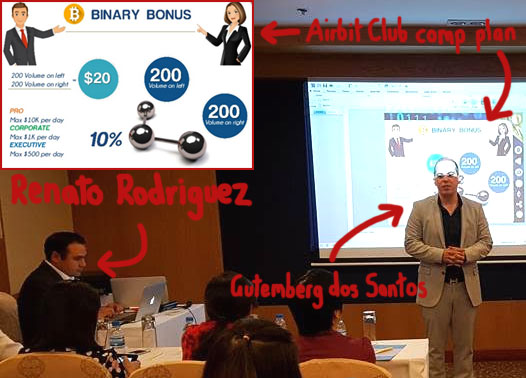Renato Rodriguez & partner settle Vizinova fraud charges
 On March 2nd the SEC filed a lawsuit against Vizinova and owners Renato Rodriguez (full name: Pablo Renato Rodriguez Arevalo) and Gutemberg Dos Santos.
On March 2nd the SEC filed a lawsuit against Vizinova and owners Renato Rodriguez (full name: Pablo Renato Rodriguez Arevalo) and Gutemberg Dos Santos.
Vizinova launched in March, 2014 and for all intents and purposes was a reboot of Phil Ming Xu’s WCM777 Ponzi scheme.
Both Rodriguez and Dos Santos were affiliates in WCM777.
In their complaint, the SEC allege that Vizinova was a $5 million dollar Ponzi scheme.
Through the shell companies Kingdom Marketing Group, Eagle Holdings Group and FirstNet United, Rodriguez and Dos Santos laundered and kept about 30% of invested funds.
There is no U.S.-based entity called Vizinova. Instead, Rodriguez and Dos Santos used Mexican nationals as nominees to incorporate an entity known as
Vizinova S.A. de C.V, in Mexico in April 2014.Although Mexican law precluded them from incorporating the entity, Rodriguez and Dos Santos controlled Vizinova.
Vizinova’s business model saw affiliates invest in Ponzi points, which could be used to purchase goods and services via an e-commerce platform.
This was on top of a ROI of up to 166% and pyramid recruitment commissions, which by far made up the bulk of the business.
As per the SEC’s investigation;
The “platforms” and products were clearly intended to legitimize the entire endeavor, but very few products existed or were purchased or sold – the true incentive for investors was to accumulate and sell points which ultimately proved to be worthless.
Rodriguez and Dos Santos refused to participate in the SEC’s investigation into Vizinova. Upon confronted with first-hand evidence of fraud, both scammers asserted their Fifth Amendment rights.
The Fifth Amendment (Amendment V) to the United States Constitution is part of the Bill of Rights and protects a person from being compelled to be a witness against themselves in a criminal case.
I had a look on Pacer but at the time of publication there doesn’t appear to be a criminal case filed for either Rodriguez or Dos Santos.
That doesn’t mean a criminal investigation isn’t underway, which Rodriguez and Dos Santos appear to be aware of.
Meanwhile in their civil case against the pair, the SEC allege
Rodriguez and Dos Santos knowingly took numerous deceptive actions in furtherance of the Vizinova scheme.
They held themselves out as Vizinova to investors and sales agents.
They provided their subordinates with false information that described Vizinova as a legitimate multi-level marketing enterprise, and rewarded those subordinates with commissions for using those falsehoods to solicit
new investors.They controlled all of the U.S.-based bank accounts into which investor monies were deposited and from which investor monies were disbursed – as “returns” to investors and for the purpose of purchasing real property, expensive cars, and other luxuries for themselves.
In total Rordriguez and Dos Santos personally stole $1.8 million of funds from “unqualified (and) unsophisticated” Vizinova investors.
Rodriguez used almost $860,000 to purchase a house, $280,000 in
withdrawals or checks to himself, and diverted $150,000 to other entities he
controlled.Dos Santos spent approximately $200,000 in withdrawals or checks to himself, $200,000 on a Lamborghini, and $100,000 on mortgage payments.
Having failed to register either themselves or Vizinova with the SEC, the regulator’s lawsuit charged them with
- fraud in the connection with the purchase and sale of securities
- fraud in the offer or sale of securities and
- the unregistered offer and sale of securities
Rather than clear their name and explain how Vizinova wasn’t a Ponzi scheme, Rodriguez and Dos Santos settled with the SEC on March 2nd.
As part of proposed settlement, Rodriguez and Dos Santos will pay back $1.4 million in disgorgement, on top of a $160,000 fine each.
Neither Rodriguez or Dos Santos are admitting or denying the SEC’s allegations (wink wink, nudge nudge), and court approval is still required before the settlement is made final.
After Vizinova collapsed, Rodriguez and Dos Santos continued scamming people through AirBit Club, launched mid last year.

AirBit Club is pretty much more of the same. Affiliates invest $250 to $1000 in bitcoin on the promise of a daily ROI for 125 to 300 days. Pyramid commissions are also paid out upon recruitment of new affiliate investors.
Alexa traffic statistics for the AirBit Club website suggest the scam is still operating, primarily in Japan and Colombia.
Possibly in an attempt to hide his ongoing attempts to defraud investors, Rodriguez sent BehindMLM a cease and desist after we reviewed AirBit Club shortly after launch.
How much Rodriguez and Dos Santos have stolen from AirBit Club investors since it launched last year is unknown.
AirBit Club is not mentioned in the SEC’s Vizinova complaint or proposed settlement agreement. SEC settlement agreements typically require defendants to cease engaging in fraud, so how that plays out with AirBit Club remains to be seen.
Whether or not AirBit Club will feature in pending criminal charges against Rodriguez and Dos Santos will also be of interest when the time comes.
Stay tuned…
Update 17th June 2017 – On June 8th Final Judgments were entered against Renato Rodriguez and Gutemberg Dos Santos
Update 19th August 2020 – Earlier today indictments against Renato Rodriguez and Gutemberg Dos Santos were unsealed.

